Read Time: 5 Minutes Subscribe & Share
A Difference In Cultures
Among the schisms between the US and EU that don’t seem to be much discussed is the difference in approaches to mashed potatoes. Ours are fluffy clouds; theirs is a puddle of puree. While the potato itself is a New World vegetable, the Spanish are credited with importing spuds to Europe in the 16th century, where they served primarily as a source of food for hogs. They remained a suspect tuber for French consumption, leading to a law in 1748 that prohibited their propagation due to the fear that potatoes caused leprosy. (They don’t.)
Of Potatoes And Smallpox
The French have had a dramatic change of heart. Now they like to think that the potato as a mainstay on our plates was their invention (I imagine that they are also taking credit for purée) because Antoine Parmentier won an essay contest in 1771 about using potatoes in making bread. He was the Ur marketer of potatoes as an inexpensive staple and as a good source of nutrition- something he found out in a long stretch in a German prison during the Seven Years War, where he, like Matt Damon in The Martian, survived on potatoes. Ultimately, his research and potato public relations stunts caused the potato law to be rescinded in 1772. One of his PR ploys was to send bouquets of potato blossoms to the queen of France.
they are also taking credit for purée) because Antoine Parmentier won an essay contest in 1771 about using potatoes in making bread. He was the Ur marketer of potatoes as an inexpensive staple and as a good source of nutrition- something he found out in a long stretch in a German prison during the Seven Years War, where he, like Matt Damon in The Martian, survived on potatoes. Ultimately, his research and potato public relations stunts caused the potato law to be rescinded in 1772. One of his PR ploys was to send bouquets of potato blossoms to the queen of France.
He was a man of diverse talents. As the Pharmacist to the French Army under Napoleon, Parmentier mandated the first smallpox vaccination, spearheaded the production of sugar from sugar beets and founded a bread baking school. Vive la variété!
Equipment Talk
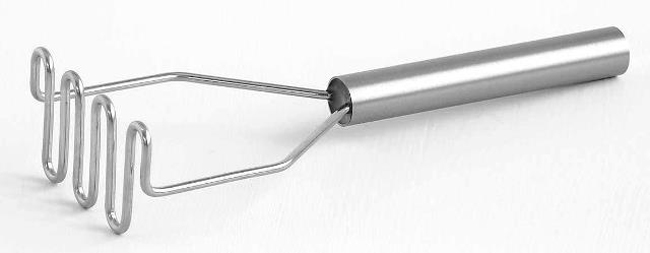 But back to mashed potatoes…I am not counting the pasty version made with the old style wood potato masher, which I remember from my post-war childhood in Munich, Germany. I’m also ignoring the lumpy version so adored by the British (they credit themselves with inventing mashed potatoes and gravy) and some misled Americans. That version is made with a metal utensil invented in 1887.
But back to mashed potatoes…I am not counting the pasty version made with the old style wood potato masher, which I remember from my post-war childhood in Munich, Germany. I’m also ignoring the lumpy version so adored by the British (they credit themselves with inventing mashed potatoes and gravy) and some misled Americans. That version is made with a metal utensil invented in 1887.
No one knows the exact inventor of the potato ricer, but it did not become widely available until the 1930s. Food mills that we know today (rather than drum sieves) have been around kitchens only since 1928. We carried modern versions of all four potato tools at the shop as our customers were convinced that one or the other was the only way to make mashed potatoes. While we never had to separate arguing defenders of each type, there were always heated discussions in the shop around Thanksgiving on this subject.
Purée Royale
Joel Robuchon probably made the most famous version of the potato purée found in many high falutin’ restaurants. I actually was told politely but firmly by a waiter in his restaurant Jamin that I had to order it. It was nice, really a lot of creamy butter molecules mixed in with a few potato molecules. I have made it once at home and below is a video illustrating the technique. This particular one does not run the potato puree through a drum sieve after the butter and milk are whisked in, a final step that the fanatical Robuchon did, at least in the cookbook I have. He used little La Ratte potatoes, which became the rage at some farmers markets in the US. And he boiled them whole in the skin, as he believed that skin preserved a superior potato flavor and kept the potatoes from absorbing too much moisture.
Russets Reign Supreme
While this may be true, I found it unhelpful when peeling any potato hot off the stove and, while it may be ok with small thin potatoes, with larger potatoes, the exterior part of the flesh is overcooked by the time the center becomes soft. I still think Russets make the smoothest and fluffiest mashed potatoes. Running them through a food mill, even with the medium plate, leads to a flatter texture, and using a ricer (and having tried both the ones with perforated sides versus closed sides, I think the latter is preferable) produces a lighter, airier version.
I have not found Russet potatoes in my adopted city, and have been using a few other varieties. I still peel and cut them into chunks (1 1/2 inches or 2 cm) and put them in cold water in a pot on the stove. I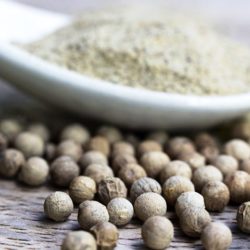 add a piece of celery, bay leaf, a small onion and a carrot along with some salt, bring them to a boil and then simmer until just soft. Once drained thoroughly (and the flavoring veggies removed) I press them through a ricer into the same saucepan, add some butter, warm milk and cream. You don’t even need an electric mixer. Once they are riced, just a whisk. even a fork or wood spoon will do the job. You can add goat cheese or crème fraiche. I also use white pepper instead of black pepper for personal aesthetic reasons.
add a piece of celery, bay leaf, a small onion and a carrot along with some salt, bring them to a boil and then simmer until just soft. Once drained thoroughly (and the flavoring veggies removed) I press them through a ricer into the same saucepan, add some butter, warm milk and cream. You don’t even need an electric mixer. Once they are riced, just a whisk. even a fork or wood spoon will do the job. You can add goat cheese or crème fraiche. I also use white pepper instead of black pepper for personal aesthetic reasons.
Soup, Beautiful Soup
A bonus from making this type of mashed potatoes is that leftovers make quite a lovely soup, even better than the delicious option of reheating them and serving them with yet another helping of your once-a-year turkey. And yes, I did try the mashed potato pancakes that my mother in law used to make, and really this is so much better. For about 2- 3 cups of mashed potatoes, in a casserole lightly sauté 1/2 – 3/4 cup diced onion (it can be any variety) until soft and translucent, but not browned. Add a cup of warm broth (you should have some from your Turkey Day aftermath) and then gradually add the mashed potatoes, stirring the additions in with a whisk. At this point, add more broth, and some milk or cream, until you get the consistency desired. You should add some very finely chopped rosemary and sage. Allow the soup to simmer – you can usually taste and smell the spritely addition of these two herbs in the soup. Add a a tablespoon or two of good quality white wine vinegar at the end. I like the champagne vinegar from Martin Pouret but a good rice wine vinegar is nice too. If you have some leftover bread stuffing, sauté some in some butter until it crisps up, and use that as a garnish. Serve with a salad, some cheeses and bread and you would never suspect it’s leftovers.
the additions in with a whisk. At this point, add more broth, and some milk or cream, until you get the consistency desired. You should add some very finely chopped rosemary and sage. Allow the soup to simmer – you can usually taste and smell the spritely addition of these two herbs in the soup. Add a a tablespoon or two of good quality white wine vinegar at the end. I like the champagne vinegar from Martin Pouret but a good rice wine vinegar is nice too. If you have some leftover bread stuffing, sauté some in some butter until it crisps up, and use that as a garnish. Serve with a salad, some cheeses and bread and you would never suspect it’s leftovers.
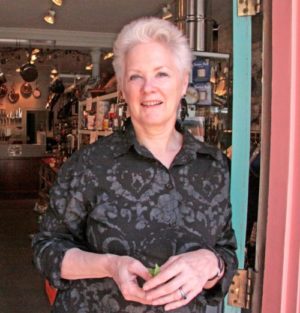
Kitchen Detail shares under the radar recipes, explores the art of cooking, the stories behind food, and the tools that bring it all together, while uncovering the social, political, and environmental truths that shape our culinary world.
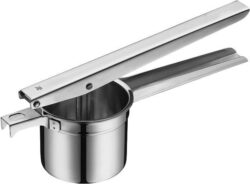
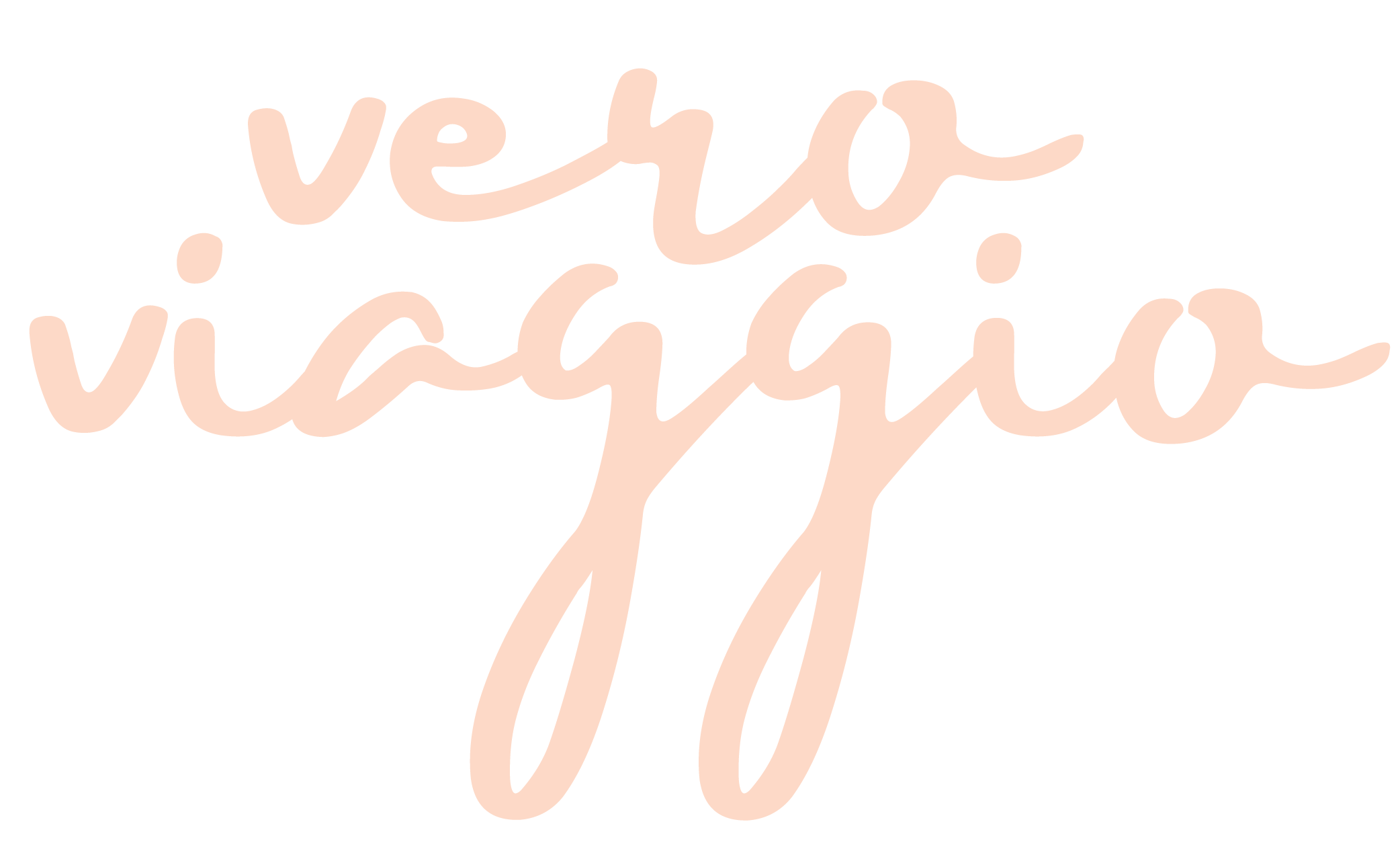



Comments are closed here.
Follow this link to create a Kitchen Detail account so that you can leave comments!